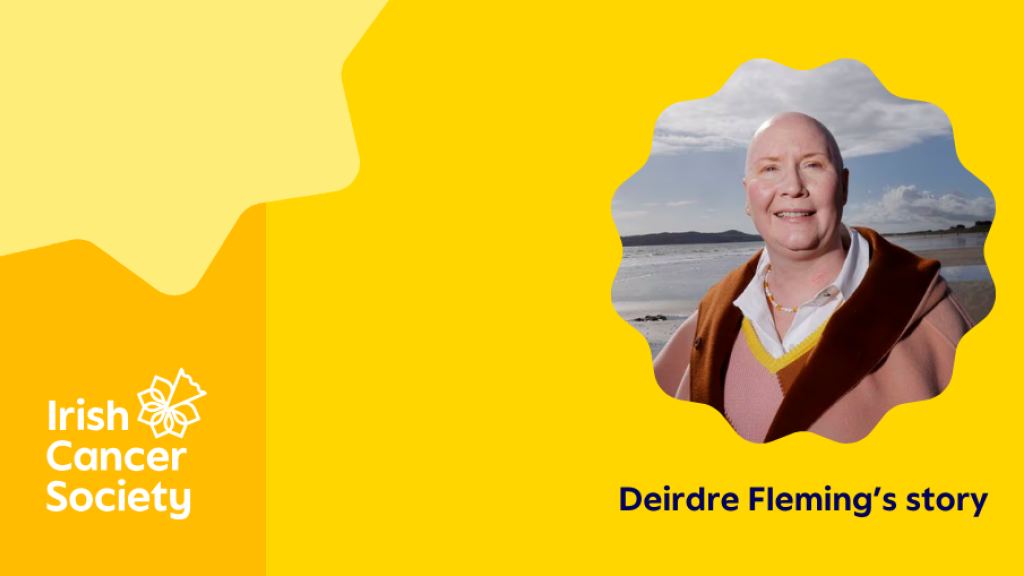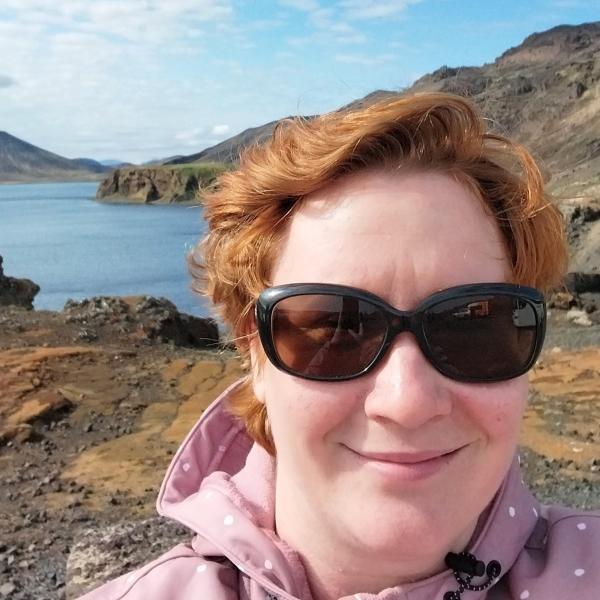

From July 2021, Deirdre Fleming, then just 41 years old, noticed she was going to the toilet more often. “I went to my GP, and they suspected irritable bowel syndrome (IBS). Between November that year and the following January/February, the weight fell off me and I was really concerned. I changed GP and my new doctor pushed me forward for an urgent colonoscopy.”
Following her colonoscopy in early March 2022, Deirdre was told it was likely to be cancer. “They were fairly certain but needed to send me for a biopsy. I got confirmation on 28th March that I had cancer diagnosis and two days later I was in for surgery. My medical team have been so open and honest with me throughout – they explained they just wouldn’t know how much it had spread until they got in and had a look. My surgery ended up being extensive. They removed one-third of my colon, lymph nodes and part of my stomach where it had spread to. They then did an MRI after my surgery which showed my cancer had spread to my liver. I’d need more surgery, but right then, they started me on intensive chemotherapy. On my first day in the hospital, I remember volunteers from the Daffodil Centre brought us around the hospital and we had an Irish Cancer Society presentation about chemotherapy and side effects.”
Deirdre’s diagnosis was a complete shock for her and her family. “In the moment, when you hear the news, it just doesn’t sink in. There wasn’t really time there and then to reflect. You get the news and days later you’re straight into surgery and on your treatment journey. It’s like I was going through the motions.”
"I had a cancer-free summer in 2023. I spent time with my friends and family, and I travelled and went to gigs and ate out in restaurants. It was amazing just to get back to some sort of normality."
After responding positively to her chemotherapy, Deirdre was put forward for liver surgery. “My first round of chemotherapy wasn’t so bad at first, but then as you get weaker, and you have to go back in and face another cycle, it gets more difficult. Once we finished that, the medical team said I was strong enough and in a good place for surgery on my liver. 6 out of the 8 lobes on my liver were cancerous so I needed major surgery. This recovery was much harder than my previous bowel surgery – as I got back on my feet, even if I walked for about 20 minutes, I’d need a two-hour nap. After surgery, all the tumours were removed so I was technically NED (no evidence of disease). It was amazing, I felt that all the pain was ok as I still had a future.” Deirdre would require further “mop up” chemotherapy once she fully recovered from surgery which took her up to Christmas Eve 2022.
However, early 2023, there was recurrence in her liver. “They blasted me with strong radiotherapy around Easter time and thankfully, scans revealed it worked. I had a cancer-free summer in 2023. I spent time with my friends and family, and I travelled and went to gigs and ate out in restaurants. It was amazing just to get back to some sort of normality. I was back working full time again. Life was good again.”
“By September 2023, I had another reoccurrence. It was time for more intensive chemotherapy. Just as my hair was starting to grow back, I started to lose it again. I responded well to that chemo, my tumours were shrinking and in January 2024, they decided to give me another three-months of it to try shrink them even further or get rid of them altogether.”
In March 2024, Deirdre’s scans revealed “no evidence of disease” (NED) once more. “It is incredibly rare for somebody with stage IV cancer like me to get an NED scan. I know my cancer hasn’t gone, it’s just asleep. I call my cancer (my Yogi Bear) – we just need to keep him asleep as long as we can.”
"I know for many patients, they don’t have somebody, or they don’t like to keep having to ask, so services like the Irish Cancer Society’s Free Transport Service are so important"
While Deirdre says she’s fortunate, not to have needed the services and supports provided by charities like the Irish Cancer Society, she recognises many patients, and their families use them. “I had my family and friends to bring me to and from my cancer appointments, but I know for many patients, they don’t have somebody, or they don’t like to keep having to ask, so services like the Irish Cancer Society’s Free Transport Service are so important and I see how they give patients peace of mind. As well as that, I know the Night Nursing service is amazing and gives people the comfort of spending their final days at home surrounded by loved ones. In July 2022, I did the Irish Cancer Society’s ‘Walk a Marathon Challenge’, and I raised over €7,500 with kind donation of family and friends to support their important work.”
“Those services are really important, but for me, I actually found going through my diagnosis as a younger bowel cancer patient quite lonely. There weren’t many specific peer supports available for people my age, and there weren’t many patients for me to talk to who knew what I was going through. Then I started to come across other bowel cancer patients on social media. A group of patients came together to form the Irish Colorectal Cancer Community. We want to work together to ensure that anybody going through bowel cancer, but especially those under 50, which is on the rise, have that peer support network to talk to. We also want to advocate for more awareness, more research and more cancer trials focusing on bowel cancer.”
“I just want people to hear my story and become more aware of the signs and symptoms of bowel cancer and to not be afraid to talk about your poo.”
Deirdre wants people to hear her story and act at once if they are experiencing any signs or symptoms of bowel cancer. “I was a young healthy woman, playing badminton every week, and then my toilet habits changed, I lost weight rapidly and within months, I’m diagnosed with bowel cancer. I just want people to hear my story and become more aware of the signs and symptoms and to not be afraid to talk about your poo. It makes people, but especially Irish people, uncomfortable to talk about, but we need to talk about it. I regularly ask my friends “how’s your poo?” and the more we do this, the better. I also really think it is just so important that people please avail of free bowel screening. It’s currently only open for people aged 59-69, and it must get expanded to 50-74 as planned, but until then, those in the current age bracket, please get screened – it could save your life.”
